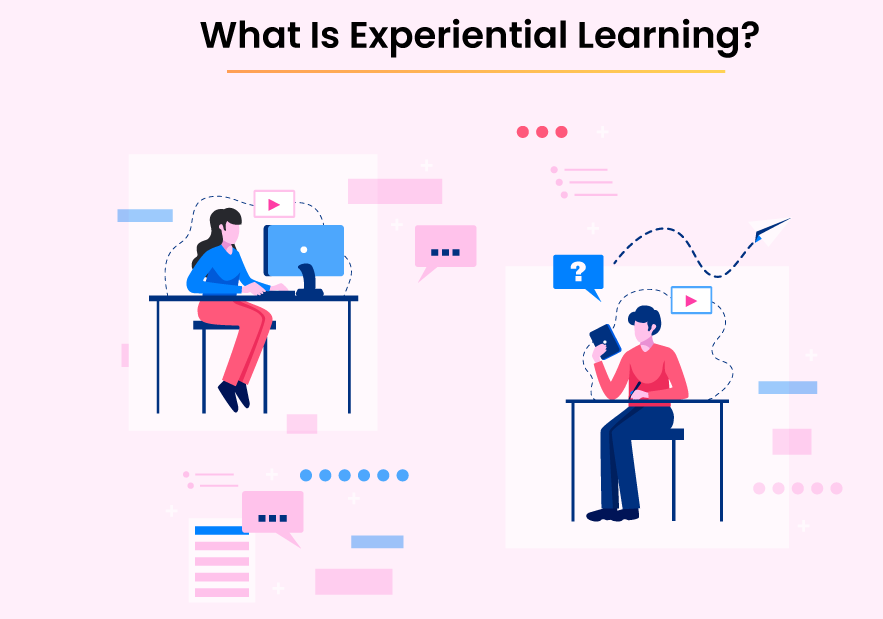
In today’s ever-changing world of higher education, it is extremely important to focus more and more on experimental learning. The days have gone by when only theoretical knowledge was used to measure the complexities of the corporate world. Furthermore, in today’s increasingly evident world, it is important to have hands-on experience as it is essential for bridging the gap between theory and practice. This is especially true for Bachelor of Commerce (B.COM) Honors programs, where experiential learning plays a very essential role in developing the next generation of business leaders.
Understanding Experiential Learning

Experimental learning is the educational method that focuses on learning through experiences. This involves applying theoretical knowledge to real-world experiences so the students can actively engage themselves in real-world contexts. In contrast to traditional lecture-based learning, whose main focus is on providing knowledge in passive ways, experimental learning is one of the ways that encourages students to actively take part in education.
The basic fundamentals of experiential learning are mostly about developing critical thinking, problem-solving skills, and the ability to adapt to diverse situations. Furthermore, by involving students in practical experiences, educators get an opportunity to prepare the students for challenges that will help them overcome them in the future during their career journey.
The Role of Experiential Learning in B.COM (Hons) Programs
B.Com (Hons) program is designed to offer students an in-depth understanding of a wide range of business topics such as accounting, finance, marketing, and management. Where theoretical knowledge is the formation of these programs, there, experiential learning acts as an encouragement for applying information in real-world settings.
Incorporating experiential learning into B.COM (Hons) programs is one of the primary benefits, as it helps the student develop a comprehensive understanding of the basic concepts. Furthermore, instead of only reaping knowledge from the textbooks or lectures, students should actively engage themselves with the course materials via hands-on activities, simulations, case studies, and internships.
Key Components of Experiential Learning in B.COM (Hons) Programs
Here are some the key components of experiential learning in B.Com (Hons) programs:
Internships and Work Placement
To gain real-world experience in the field of their choice, internships offer students with invaluable opportunities. The internships let the students apply the knowledge gained in the classroom to real-world professional places. The professional setting includes working for a multinational corporation, a nonprofit organization, or a startup.
Industry Collaborations
Another essential part of experiential learning in B.COM (Hons) programs is collaborating with industry partners. Universities partnering with the companies and organisation help the students by offering them the access to the industry experts, guest lectures, and collaborative projects. Also, it helps in bridging the gap between the academics and the real-world.
Simulations and Case Studies
Case studies and simulations are known as effective tools for replicating real-world situations in an environment that can be monitored. Whether it’s simulating stock market trading, analyzing business cases, or participating in role-playing exercises, with the help of these activities students can develop the skills of critical thinking and decision-making.
Entrepreneurship Initiatives
To encourage students who have innovative thinking skills and are interested in developing entrepreneurial skills, for them there are many B.COM (Hons) programs which include entrepreneurship initiatives. Whether it is a business plan competitions to startup incubators, these initiatives are designed in a way so that the students gets an opportunity to turn their ideas into reality. Furthermore, it also helps in gaining hand-on experience in starting and managing the businesses.
Benefits of Experiential Learning in B.COM (Hons) Programs
Below are the following benefits of experiential learning in B.Com (Hons) programs:
Enhanced Employability
Experiential learning helps the students in gaining practical skills and real-world experience that is valued by the employers. Furthermore, because of the active engagement in practical activities as well as internships, the students get an opportunity to develop a competitive advantage in the job market. Also, prepare them for the transition from academia to the workforce.
Deeper Understanding
By applying the theoretical concept of the course material into the practical settings, a student gets the opportunity to develop a comprehensive understanding. And this is all because of the experiential learning. Furthermore, this not only let you improve your retention but also help you in developing the skill of critical thinking and problem-solving.
Professional Networking
Because of the internships, industry collaborations, and entrepreneurship initiatives, students gets the opportunity to build a relationship with the industry professionals, mentors, and fellow students. This professional networking will be an invaluable asset for your career development and future opportunities.
Preparation for Leadership Roles
The experiential learning will help in developing the skills that is essential to get success in the leadership roles. The skills include the leadership qualities, communication skills, and interpersonal skills. Furthermore, students can get valuable experience in leadership and teamwork, by actively working on team projects, collaborating with peers, and interacting with industry professionals.
Challenges and Considerations
The experiential learning offers a wide range of benefits, but like every advantage there comes the challenges that are important to be addressed. The issue includes logistical issues such as finding suitable internship placements, assuring adequate supervision and support, and also assessing student learning outcomes. Furthermore, there can be issues regarding equity and access because of the opportunities to participate where students don’t get equal chance of engagement in the experiential learning activities.
Therefore, to overcome this challenge, the universities should invest in the infrastructure and resource, so as to support the experiential learning initiatives. This may include establishing partnerships with industry partners, providing funding for internships and entrepreneurship initiatives. Also this may offer support service for the students who are participating in the experiential learning activities.
Conclusion
To conclude, experiential learning plays one of the important role in B.COM (Hons) programs, as it helps in bridging the gap between theory and practice. If the students actively enages in practical experiences, then university will be able to help them in meeting the requirement of the modern business world. So, to suceed in the future career, students need to have practical skills, real-world experience, and professional networks. And these they can only get through internships, industry collaborations, simulations, or entrepreneurship initiatives as it offers the students with experiential learning. With this ever-changing era, a B.COM (Hons) program continues to evolve. And this is where experiential learning will be without a doubt a pillar of education which empowers students to become the business leaders of tomorrow.





